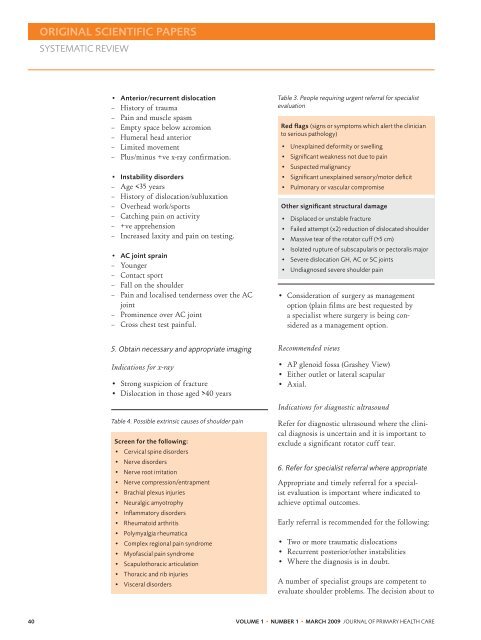entire issue. - The Royal New Zealand College of General ...
entire issue. - The Royal New Zealand College of General ...
entire issue. - The Royal New Zealand College of General ...
Create successful ePaper yourself
Turn your PDF publications into a flip-book with our unique Google optimized e-Paper software.
ORIGINAL SCIENTIFIC PAPERS<br />
SYSTEMATIC REVIEW<br />
• Anterior/recurrent dislocation<br />
– History <strong>of</strong> trauma<br />
– Pain and muscle spasm<br />
– Empty space below acromion<br />
– Humeral head anterior<br />
– Limited movement<br />
– Plus/minus +ve x-ray confirmation.<br />
• Instability disorders<br />
– Age 40 years<br />
Table 4. Possible extrinsic causes <strong>of</strong> shoulder pain<br />
Screen for the following:<br />
•<br />
•<br />
•<br />
•<br />
•<br />
•<br />
•<br />
•<br />
•<br />
•<br />
•<br />
•<br />
•<br />
•<br />
Cervical spine disorders<br />
Nerve disorders<br />
Nerve root irritation<br />
Nerve compression/entrapment<br />
Brachial plexus injuries<br />
Neuralgic amyotrophy<br />
Inflammatory disorders<br />
Rheumatoid arthritis<br />
Polymyalgia rheumatica<br />
Complex regional pain syndrome<br />
My<strong>of</strong>ascial pain syndrome<br />
Scapulothoracic articulation<br />
Thoracic and rib injuries<br />
Visceral disorders<br />
Table 3. People requiring urgent referral for specialist<br />
evaluation<br />
Red flags (signs or symptoms which alert the clinician<br />
to serious pathology)<br />
Unexplained deformity or swelling<br />
• Consideration <strong>of</strong> surgery as management<br />
option (plain films are best requested by<br />
a specialist where surgery is being considered<br />
as a management option.<br />
Recommended views<br />
• AP glenoid fossa (Grashey View)<br />
• Either outlet or lateral scapular<br />
• Axial.<br />
Indications for diagnostic ultrasound<br />
Refer for diagnostic ultrasound where the clinical<br />
diagnosis is uncertain and it is important to<br />
exclude a significant rotator cuff tear.<br />
6. Refer for specialist referral where appropriate<br />
Appropriate and timely referral for a specialist<br />
evaluation is important where indicated to<br />
achieve optimal outcomes.<br />
Early referral is recommended for the following:<br />
• Two or more traumatic dislocations<br />
• Recurrent posterior/other instabilities<br />
• Where the diagnosis is in doubt.<br />
A number <strong>of</strong> specialist groups are competent to<br />
evaluate shoulder problems. <strong>The</strong> decision about to<br />
40 VOLUME 1 • NUMBER 1 • MARCH 2009 J OURNAL OF PRIMARY HEALTH CARE<br />
•<br />
•<br />
•<br />
•<br />
•<br />
Significant weakness not due to pain<br />
Suspected malignancy<br />
Significant unexplained sensory/motor deficit<br />
Pulmonary or vascular compromise<br />
Other significant structural damage<br />
•<br />
•<br />
•<br />
•<br />
•<br />
•<br />
Displaced or unstable fracture<br />
Failed attempt (x2) reduction <strong>of</strong> dislocated shoulder<br />
Massive tear <strong>of</strong> the rotator cuff (>5 cm)<br />
Isolated rupture <strong>of</strong> subscapularis or pectoralis major<br />
Severe dislocation GH, AC or SC joints<br />
Undiagnosed severe shoulder pain

















